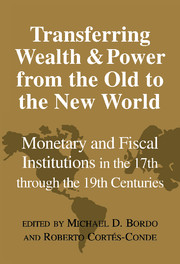 Transferring Wealth and Power from the Old to the New World
Transferring Wealth and Power from the Old to the New World Published online by Cambridge University Press: 27 March 2010
INTRODUCTION
This is a rich and timely collection of chapters to contemplate. Beyond the skill with which each of the authors crafts his or her contribution, this book is relevant for at least three major innovations.
First, it invokes fiscal and monetary policy as its basic subject, a novelty for the period. We are inclined to take the seventeenth through the nineteenth centuries as the era preceding and including the Industrial Revolution, and to look at economic history through the lens of technological change and establishment of the new manufacturing industries. Here, instead, we focus on government and the public sector as it operated in the Old World as well as the New.
Second, it emphasizes the internal tasks of augmenting tax collection and subsequently appropriating the resources rather than the more typical emphasis upon rapidly increasing international trade and capital flows during this period. As such, it is more focused on the insights originally emanating from Lance Davis, Douglass North, Mancur Olson, Oliver Williamson, and others concerning the relationship between institutional change and the process of development. Transactions costs figure prominently in the broad range of causal forces that lead to changing patterns of taxation and expenditure.
Third, it contrasts the New World, and its institutions, with the Old. One of the obvious and important differences is the historical reliance upon the rate of inflation, and the inflationary tax, that characterized the countries of North and South America.
To save this book to your Kindle, first ensure [email protected] is added to your Approved Personal Document E-mail List under your Personal Document Settings on the Manage Your Content and Devices page of your Amazon account. Then enter the ‘name’ part of your Kindle email address below. Find out more about saving to your Kindle.
Note you can select to save to either the @free.kindle.com or @kindle.com variations. ‘@free.kindle.com’ emails are free but can only be saved to your device when it is connected to wi-fi. ‘@kindle.com’ emails can be delivered even when you are not connected to wi-fi, but note that service fees apply.
Find out more about the Kindle Personal Document Service.
To save content items to your account, please confirm that you agree to abide by our usage policies. If this is the first time you use this feature, you will be asked to authorise Cambridge Core to connect with your account. Find out more about saving content to Dropbox.
To save content items to your account, please confirm that you agree to abide by our usage policies. If this is the first time you use this feature, you will be asked to authorise Cambridge Core to connect with your account. Find out more about saving content to Google Drive.